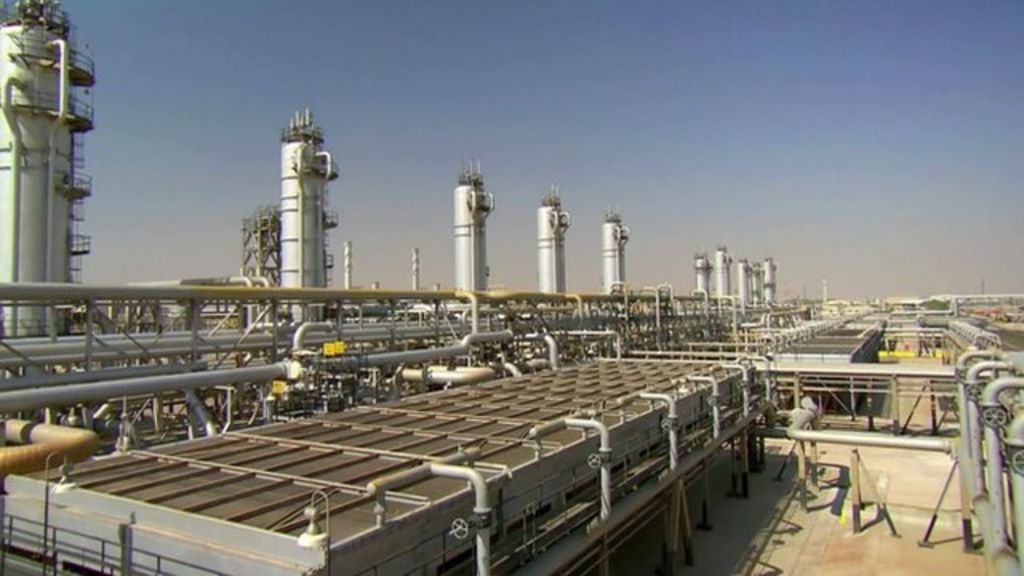
The World’s Most Profitable Company
Seen as Saudi Arabia’s business crown jewel, the oil giant employs more than 65,000 people worldwide.
(September 14, 2019) — The latest drone attacks on Saudi Aramco oil facilities come as Saudi Arabia, the world’s top crude exporter, steps up preparations to sell shares of the state-owned energy giant.
Attacks claimed by Yemen‘s Houthi rebels sparked fires at the Abqaiq and Khurais sites on Saturday, which have since been controlled, the Saudi state news agency reported.
Aramco describes its Abqaiq oil-processing facility, in the kingdom’s Eastern Province, as “the largest crude oil stabilisation plant in the world”.
Estimates suggest it can process up to seven million barrels of crude oil a day.
The Khurais complex, further southwest, has estimated reserves of more than 20bn barrels of oil, according to the company.
In a statement, the Houthis promised to widen the range of their attacks on Saudi Arabia, which leads a military coalition battling them in neighbouring Yemen.
“These attacks are our right, and we warn the Saudis that our targets will keep expanding,” a spokesman said.
Crown Jewel
Aramco, seen as the country’s business crown jewel, has been preparing to float shares as part of efforts to wean the Saudi economy off its reliance on oil.
The kingdom’s de facto ruler Crown Prince Mohammed bin Salman (MBS) has put Saudi Aramco’s overall valuation at more than $2 trillion, but even as analysts estimate a figure closer to $1.5 trillion or less, it would still be the world’s biggest initial public offering (IPO).
The IPO is the cornerstone of an economic reform programme envisaged by MBS, who touts it as a way to raise capital for the kingdom’s sovereign wealth fund.
When Aramco earnings are transferred to the sovereign wealth fund, Saudi revenue will be technically drawn from investments rather than oil, which would then be used to develop new cities and lucrative projects across Saudi Arabia.
The company employs more than 65,000 people worldwide. Its operations include exploration and production of oil and gas, as well as refining, petrochemicals, international shipping, marketing and distribution of oil and gas.
“This is no ordinary company, this is a company that runs a country, a country which is pivotal to what happens in the Middle East,” said Al Jazeera’s Osama Bin Javaid, who has examined the strategic importance of the oil giant in his documentary titled Saudi Aramco: The Company and the State.
“Saudi Aramco is at the heart of not just politics, but economy and life in Saudi Arabia.”
Vast Profits
In April, the company released its earnings figures for the first time in recent memory, showing Aramco to be the world’s most profitable company.
It revealed net profits of $111bn and revenue close to $356bn for 2018.
By contrast, Apple booked a net profit of about $60bn in its most recent full year, Royal Dutch Shell had net income of $23bn and Exxon Mobil $21bn.
Meanwhile, an independent audit showed Saudi Arabia has 268.5 billion barrels of proven crude oil reserves as of the end of 2017. Aramco produced about 10.3 million barrels per day of crude oil in 2018.
“Saudi Aramco is the largest oil producer globally by volume,” ratings agency Fitch said in April.
Aramco CEO Amin Nasser told reporters on Tuesday that the company was ready for a two-stage stock market debut including an international listing “very soon”.
Based on the indicated $2 trillion valuation that Aramco had hoped to achieve, a one-percent float would be worth $20bn.
Saudi Arabia has reportedly hired nine banks as joint global coordinators to lead the IPO, planned for as early as 2020, and has been meeting bankers this week in Dubai, UAE, as it speeds up the listing plans.
Investment Implications
Bin Javaid said Saturday’s drone attacks could have a “wider implication on Saudi Arabia and people looking at Saudi Arabia as a possible investment opportunity”.
“If you were going to put money into Saudi Arabia, this would give you pause; you would want to see how long is this going to last for and what are going to be the implications,” he said.
“What the Houthis have done is not just inflict damage, it is symbolic as well. They have told Saudi Arabia that they have a list of targets, they are going to be continuing their attacks, so this is a perpetual problem which Saudi Arabia has not been able to engage away from,” he added.
In recent months, Houthi rebels have carried out a series of drone and missile attacks targeting Saudi air bases and other facilities.
In August, a Houthi-claimed attack sparked a fire at Aramco’s Shaybah natural gas liquefaction facility but no casualties were reported by the company.
Saudi Arabia intervened in Yemen in 2015, leading a military coalition in support of the internationally recognised President Abd-Rabbu Mansour Hadi, who was forced out of power by the Houthis.
The war has killed tens of thousands of people and sparked what the United Nations calls the world’s worst humanitarian crisis.
Posted in accordance with Title 17, Section 107, US Code, for noncommercial, educational purposes.